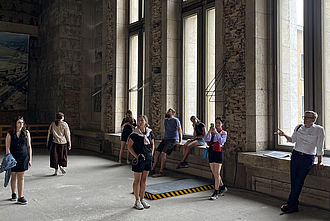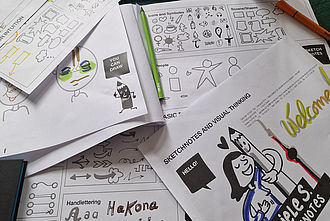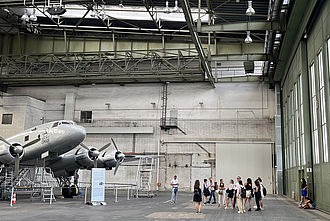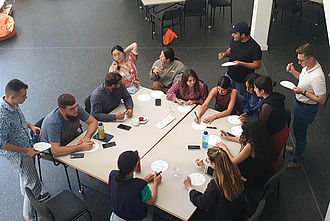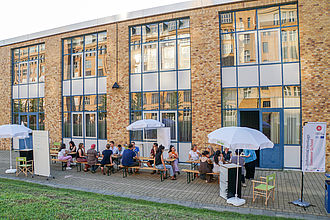Industrial Heritage Summer School
Seiteninhalt
Shaping Sustainability in Industrial Heritage
The European Industrial Heritage Summer School is an intensive 14-day academic program. The unique combination of theoretical discussions, site visits and workshops in a collaborative format provides a holistic learning experience for our participants. This years focus is the implementation of sustainability in industrial heritage sites.
The course is aimed at students from a wide range of disciplines, including museum studies, cultural studies, history – especially public history, industrial archaeology, cultural and tourism management, architecture and urban planning, as well as conservation, sustainability and communication studies. Students from other disciplines are also warmly welcome.
The preparation
Prior to the Summer School, you will visit an industrial heritage site, preferably in your home region. Later, in Berlin, you will present the site to the group. Ideally, this will be a site on the European Route of Industrial Heritage (ERIH). If necessary, we can help you find a suitable site. Once we have confirmed your participation, we will send you a questionnaire for your visit. If you can’t visit the site in person, you can alternatively research online and arrange a video call with a member of staff at your chosen site.
On the 6th of July 2024, we will meet online for a mandatory pre-meeting. You will get to know the other participants and the Summer School team and be able to ask any questions you may have.
On site in Berlin
During the first half of the Summer School we will focus on gaining knowledge and discussing the overall theme of industrial heritage. What exactly is industrial heritage? What are the different sites of industrial heritage? What does sustainability mean in the context of industrial heritage? Are there already examples of good practice for sustainability in industrial heritage? In sessions with inspiring experts, you will deepen your knowledge of industrial heritage, its current use, and its communication and marketing in relation to sustainability. In this phase of the Summer School you will also present your visited site.
In the second half of the Summer School, we will bring together the main challenges and questions. We will reflect on whether and how industrial heritage sites can (credibly) become places of good practice in sustainability.
The subsequent project workshops are based on the BarCamp format. As a participant, you will work in small groups to develop solutions and initial project ideas. You will contribute your knowledge and skills. In small groups you will decide for yourself which ideas you want to pursue and develop into projects. You will practice intercultural communication, the organization of a joint project and acquire methodological skills. The Summer School team will be there to advise you. At the end, you will present your concepts and share your experiences. To wrap up the program, we are planning some exciting visits to industrial heritage sites in Berlin.
After the Summer School you are warmly invited to stay in contact with the European Route of Industrial Heritage and become part of the new Young Professional Network. The Summer School and results of the working groups will be presented at the ERIH annual conference in October 2024.
Application
Eligible are all bachelor, master or doctoral/PhD students who have completed at least their 2nd semester and who are enrolled at a university. We strive to make the group international and diverse.
Submission of application
The application is open from 20 March to 29 April 2024. The application form has to be filled out online. Please have your enrolment certificate, transcript of records and CV ready for upload.
Confirmation of acceptance
From April 5, 2024 on a rolling basis until all places are allocated.
Capacity
A maximum of 22 students will be admitted.
Key facts
| Where | Berlin, Germany The workrooms are located on the Wilhelminenhof campus of HTW Berlin in Oberschöneweide. |
|---|---|
| When | Obligatory preparation meeting online: |
| Who | Students from Europe, aged 18-30 years old, with an interest in industrial culture and heritage. |
| Teaching Language | English. We require B2 English language skills. |
| Certification | Certification of participation (4 ECTS) Participants must apply for recognition at their university on their own behalf. |
| Participation fees | 360 € including
|
| Costs to be considered individually |
|
| Fellowship | The Summer School is a program of the European Route of Industrial Heritage in cooperation with the Berlin Center for Industrial Heritage and the HTW Berlin. The acceptance to the Summer School is linked to an ERIH scholarship, which allows to keep the participation fees low. |
| Accomodation | You will stay in shared rooms in the guesthouse of a Berlin canoe club near the HTW Berlin. During the Summer School you will live and work in a community of your own design. Two participants from Berlin will be at your side as team leaders. The house is for the group’s use only and at your responsibility. Located directly on the river spree, the accomodation has a barbecue area, kitchen, large common room, shared sanitary facilities and free WiFi. |
| Meals | The participation fee includes a food allowance (breakfast, lunch, dinner). Participants use this allowance to provide for themselves and organize a shopping and kitchen plan together. |
| Free time | Berlin hosts enormous cultural diversity and has got everything to spend your free time in an exciting way. |
Gallery Summer School 2023
Award Winning Summer School 2023
In August we welcomed 17 young people from Europe and beyond in Berlin for our first Industrial Heritage Summer School. For two weeks we discussed the connection between industrial heritage and sustainability.
The great diversity of the different study backgrounds of our students enriched the summer school immensely. We had students of:
Museum Studies, Cultural Studies, (Public) History, Industrial Archaeology, Culture and Tourism Management, Architecture and Urban Planning, as well as Historic Preservation, Sustainability and Communication Studies with us.
Together we visited several sites of industrial heritage in Berlin and met with experienced colleagues at the Museum of Technology, the Pfefferberg, the Historic Port and Tempelhof Airport, the Peter-Behrens-Bau and the former Kulturhaus in Schöneweide.
In discussions with international Industrial Heritage experts such as TICCIH President Miles Oglethorpe (Scotland), ERIH Vice President Adam Hajduga (Poland) or Public Historian Donna Graves (USA), the students developed projects of their own.
One student project could be implemented in the beginning of next year aready. The idea for an “ERIH Young Professionals Network” was presented to the ERIH Network at the Annual Conference in November 2023. The feedback was very positive.
The Summer School 2023 was rewarded with the "Best Practice Award" of the Cultural Routes of the Concil of Europe.
Partners
The Summer School 2024 is organized by the Berliner Zentrum Industriekultur (bzi) with the support of the European Route of Industrial Heritage (ERIH) and in cooperation with the University of Applied Sciences Berlin (HTW Berlin).

